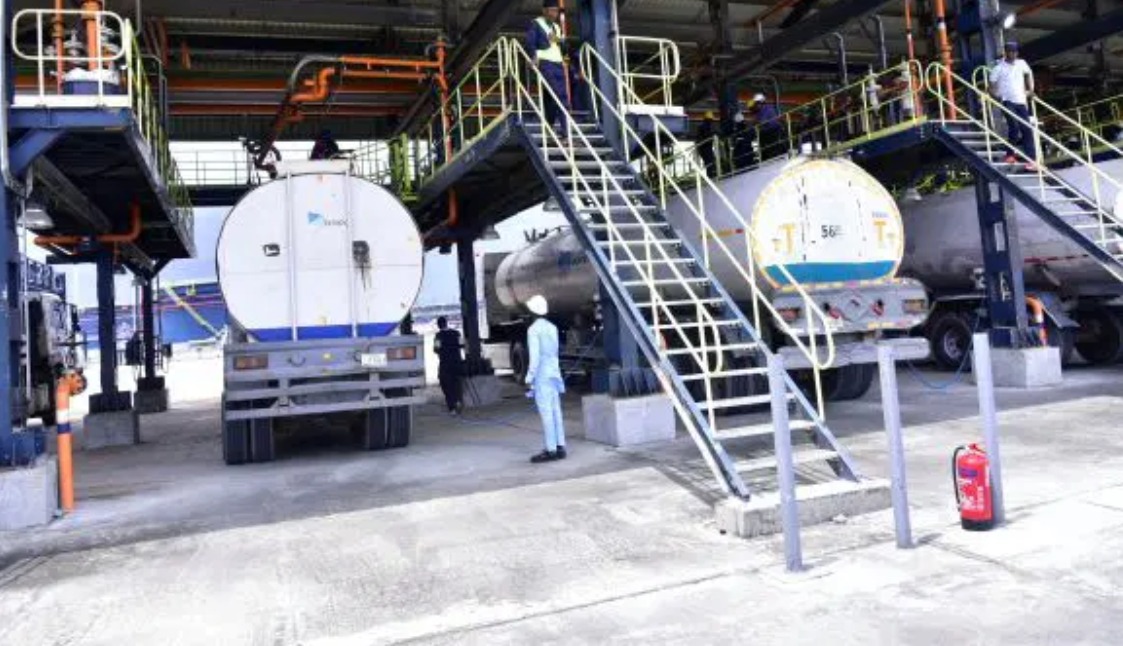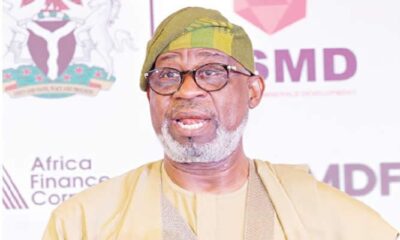Just one day before the commencement of Dangote Petroleum Refinery’s direct fuel distribution scheme, marketers and tanker drivers said they had met with the company amid fears that they might be sent out of business.
The refinery would start its direct fuel distribution on Friday, August 15, having received some of the 4,000 Compressed Natural Gas-powered trucks needed for the plan.
Dangote’s announcement of the direct fuel distribution programme had sent shivers down the spines of tanker drivers and members of the Natural Oil and Gas Suppliers Association of Nigeria over fear that they might lose their livelihoods.
In reaction, the Natural Oil and Gas Suppliers Association of Nigeria warned that the refinery’s plan to bypass existing distribution channels and supply refined petroleum products directly to end-users would lead to a nationwide disruption, long-term product scarcity, and the collapse of existing supply networks.
The oil and gas suppliers called on the refinery to halt its plan and seek further dialogue before commencing the distribution of products to end users, urging it to learn from what happened to non-functional refineries under the management of the Nigerian National Petroleum Company Limited.
They also called on President Bola Tinubu to intervene in the issue, stressing that Dangote alone cannot handle nationwide distribution of products sustainably. The NOGASA National President, Bennett Korie, made the call during the association’s Annual General Meeting held in Abuja recently.
However, tanker drivers and the petroleum product suppliers on Wednesday said that they recently met with the Dangote Group in a bid to collaborate.
The National Publicity Secretary of NOGASA, Chinedu Ukadike, and the National President of the National Association of Road Transport Owners, Yusuf Othman, confirmed this to our correspondent in an interview.
According to the NOGASA spokesman, both Dangote and the association have agreed to work together through the existing distribution channels. He said the fear of job losses had been allayed, as the refinery assured them that fuel would be sold to bulk buyers for onward distribution to end users.
Ukadike told our correspondent that Dangote would not sell petroleum products directly to end users; he would sell to NOGASA members as bulk buyers. “I want to say that Dangote heeded our plea by agreeing with us that they will be sending these products to the bulk buyers, who are the suppliers. Based on that, we don’t have issues again.
“What we were saying ab initio was the issue of the supply chain in which we have invested so much. We requested that the supply chain be given to us in distribution, which I think Dangote has also complied with, since he is not going to supply directly to end users. We want to appreciate him for that,” he said.
Ukadike stated that NOGASA members panicked because they thought Dangote would sell directly to end users. “We are the bulk buyers; we buy in bulk, and we supply. Before, we were thinking that he was going to supply by retailing to the end users, the telecom masts, hotels, and the rest of them, but now he said no, that he is going to supply to the bulk buyers.
“This is giving us that power as suppliers to continue our jobs. We were afraid that if he sold fuel directly to end users, our labour capacity would be lost and our return on investment would be in jeopardy,” he said.
Our correspondent asked Ukadike if NOGASA members met with Aliko Dangote or his team for the clarifications; he replied, “There was no time when Dangote said he wanted to sell directly to end users. There’s no way Dangote can sell to end users. We have met his team, and we spoke with his communication officer, who assured us of the value chain of distribution.”
He added that NOGASA members have started registering on the Dangote portal to be bulk buyers of the refinery’s products. He added that the trucks would supply fuel to bulk buyers.
“Some of our members who are buying in bulk are now their companies in line with the guidelines they gave to us for registration, so that they can take these products and sell to end users. We were told that the 4,000 CNG-powered trucks will be delivering to bulk buyers. Once you pay, they deliver to you, not to end users,” he explained.
In his words, the NARTO President, Othman, said consultations are still ongoing with stakeholders on the effect Dangote’s fuel distribution scheme would have on tanker drivers.
Othman stated that the association once met with Dangote himself, and there were plans to meet him again. “We are still consulting with our stakeholders. We met Dangote first, and we are going to meet him again,” he said.
The NARTO boss declined to comment on the outcome of the meeting with Dangote.
In a statement on Tuesday, the Vice President, Oil and Gas, Dangote Industries Limited, Mr Devakumar Edwin, said the planned deployment of 4,000 CNG-powered trucks to support the distribution of refined petroleum products across Nigeria is aimed at ensuring that the benefits of domestic refining and the resulting reduction in fuel prices are fully passed on to Nigerian consumers.
Edwin stated that the introduction of the CNG-powered fleet is a strategic step to reduce logistics costs in fuel distribution—a major factor in the final pump price.
“The deployment of these 4,000 CNG-powered trucks will help us pass down the benefits of domestic refining and the reduction in product prices to consumers. The aim is to support logistics and make distribution more efficient, not to displace any existing players in the sector,” he said.
He further explained that the use of CNG-powered trucks, in addition to being more environmentally friendly, will significantly reduce transportation expenses, ultimately making refined products more affordable for Nigerians.
When contacted on Wednesday to confirm the position of the marketers and tanker drivers, the spokesman of the Dangote Group, Anthony Chiejina, simply told our correspondent that the dealers should hold a press conference.
FOLLOW US ON:
FACEBOOK
TWITTER
PINTEREST
TIKTOK
YOUTUBE
LINKEDIN
TUMBLR
INSTAGRAM































